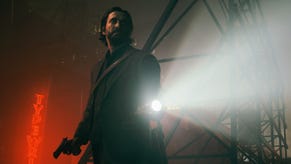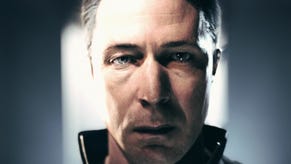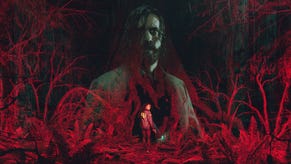Alan Wake
Wake tree arena.
Remedy's Sam Lake wants us to understand that Alan Wake isn't a horror game. Alan Wake is "a psychological action thriller that contains elements of horror". I don't want to split hairs, but it takes a little time to get comfortable with Lake's definition, because initially at least the "elements of horror" are pretty dominant: an axe-wielding madman, a satanically creepy landlord, and a wife who disappears with a blood-curdling scream all feature during a white-knuckled hour at the controls.
And all of this is before you start firing your gun at shadowy figures who burn up when you shine a torch on them. But in fairness to Lake, the supernatural elements are aimed more at building tension than horrifying or shocking the player. There's the feeling, as Wake tries to deal with monsters calling out to him from the murky woodlands of Bright Falls, that a lot of his problems may be products of his imagination.
Even before novelist player-character Wake and his other half have picked up the keys to their holiday cabin by Cauldron Lake, the player has been terrorised in a pre-credit dream sequence by one of his literary creations. Wake then arrives in Bright Falls with a chronic case of writer's block; he's on the run from his publicist and wracked with doubt over whether his talent has dried up. He argues with his wife after she unveils her plan to help him by bringing a typewriter on their vacation, and he storms off into the woods.
Later, he finds himself regaining consciousness in car-wreck. He stumbles through the darkness, coming across pages of a manuscript for a thriller he doesn't remember writing. The next thing he knows he's set upon by figures wielding hatchets and knives. Their bodies are encased in shadows that have the consistency of ink dripped through water.
If you were to tick off the influences, Stephen King and David Lynch would be near the top of the list. But Remedy keeps the game fresh with compelling level design and presentation. The way the developer toys with the player's emotions is impressively frightening; as Wake picks up the keys to his cabin from a diner, the entire mood of the scene spins on a dime from friendly and folksy to chilling.
It's also a testament to the storytelling that Alan Wake himself is a man of substance. He's a bruised, conflicted individual; intelligent but also prone to violent outbursts. What makes him compelling, however, is less that he's flawed, but more that he knows he is and that he's trying to resist the weaker side of his personality. He's already facing a fractured marriage and writer's block, but the game suggests his problems run a lot deeper. Wake's fallibility also enhances the gameplay, which puts a premium on light as a weapon.
Remedy's sense of economy and level design craft also permeates the run-and-gun action. At one stage, the player has to navigate from a car crash through a darkened lumber yard to a well-lit petrol station in the distance. The structure is loose but linear, even though the gorgeous environment suggests the player isn't restricted at all. Between the car wreck and the petrol station Wake comes across a couple of useful items like a flare gun and a spotlight (read: gun turret). He also discovers batteries, flares and ammunition, which players will want to ration.
Aiming and firing is your standard left and right trigger setup, but unlike most everymen in videogames who turn into a crack shot the moment they pick up a weapon, Wake's not a natural gunman, and the gameplay has been tweaked to this effect. Switching from running to taking aim feels a little slow, and while a quick reload is available, a mistimed tap of the button can slow this down as well. Not every shot is on target, aiming skill only increases with familiarity, and sometimes the best option is to cut your losses and leg it.








